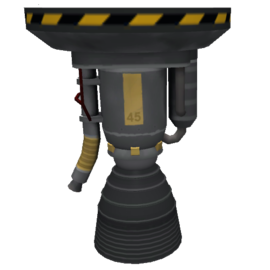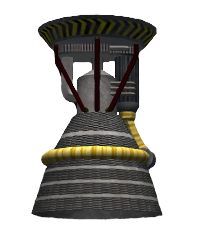LV-T45 "Swivel" Liquid Fuel Engine
| LV-T45 "Swivel" Liquid Fuel Engine | ||
| Liquid fuel engine by Jebediah Kerman's Junkyard and Spacecraft Parts Co | ||
| Radial size | Small | |
| Cost | (total) | 1 200.00 |
| Mass | (total) | 1.500 t |
| Drag | 0.2 | |
| Max. Temp. | 2000 K | |
| Impact Tolerance | 7 m/s | |
| Research | | |
| Unlock cost | 3 500 | |
| Since version | 0.12 | |
| Part configuration | liquidEngineLV-T45_v2.cfg | |
| Maximum thrust | (1 atm) | 167.97 kN |
| (vacuum) | 215.00 kN | |
| Isp | (1 atm) | 250 s |
| (vacuum) | 320 s | |
| Fuel consumption | 13.70 | |
| Thrust vectoring | 3 ° | |
| Electricity generated | 6.0 ⚡/s | |
| Testing Environments | ||
| On the surface | Yes | |
| In the ocean | Yes | |
| On the launchpad | Yes | |
| In the atmosphere | Yes | |
| Sub-orbital | Yes | |
| In an orbit | Yes | |
| On an escape | Yes | |
| Docked | No | |
| Test by staging | Yes | |
| Manually testable | Yes | |
| Packed volume | None | |
The LV-T45 Liquid Fuel Engine is an engine which requires fuel from external liquid fuel tanks, and must be either connected beneath them or be on the receiving end of a fuel line.
Usage
The LV-T45 was the first liquid fuel engine with thrust vector control, that allows efficient control of the rocket when it is most needed - during ascent and orbit correction burns. Despite having the same specific impulse as the LV-T30 Liquid Fuel Engine, the more complex LV-T45 has slightly less thrust resulting in a longer burn time at the same fuel amount. Parallel ignition of several LV-T30 and LV-T45 engines at lift-off can lead to maximized thrust without losing control.
However, the LV-T45 has a mass of 1.5 tons and as said before, less thrust compared to the LV-T30, which masses 1.25 tons. This means a worse TWR.
Like LV-T30, the LV-T45 cannot be placed on radial decouplers and are typically reserved as a main engine after lift-off. The LV-T45 must be directly below a non-empty fuel tank to produce any thrust.
Description
| “ | The LV-T45 engine was considered another breakthrough in the LV-T series, due to its Thrust Vectoring feature. The LV-T45 can deflect its thrust to aid in craft control. All these added mechanics however, make for a slightly smaller and less powerful engine in comparison with earlier LV-T models. — Jebediah Kerman's Junkyard and Spaceship Parts Co. |
” |
Changes
- Electricity production increased to 6.0
- Retextured
- Alternator added, engine now gains 1.0 electricity
- Major CFG revision (most notably Isp added)
- Initial Release

